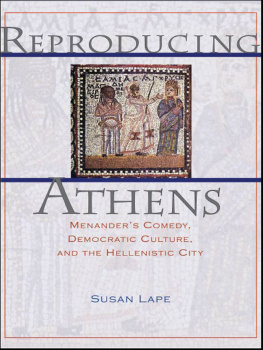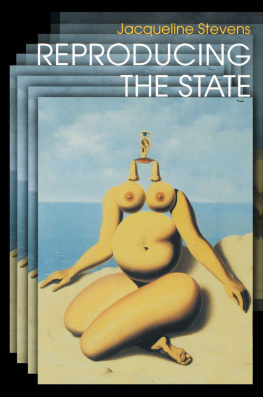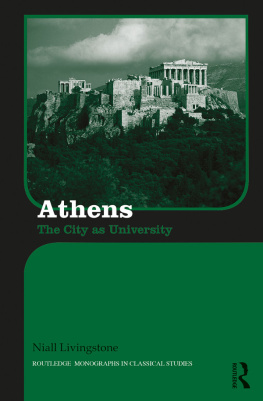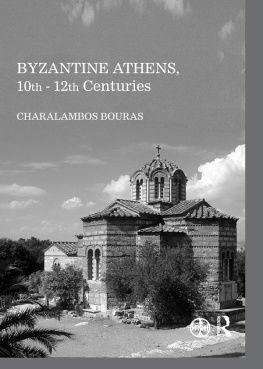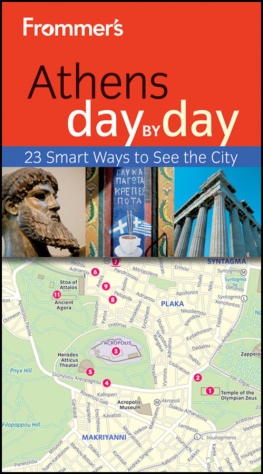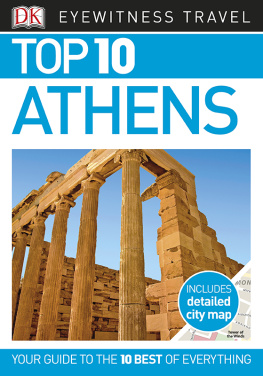Lape - Reproducing Athens
Here you can read online Lape - Reproducing Athens full text of the book (entire story) in english for free. Download pdf and epub, get meaning, cover and reviews about this ebook. year: 2008, publisher: Princeton University Press, genre: Politics. Description of the work, (preface) as well as reviews are available. Best literature library LitArk.com created for fans of good reading and offers a wide selection of genres:
Romance novel
Science fiction
Adventure
Detective
Science
History
Home and family
Prose
Art
Politics
Computer
Non-fiction
Religion
Business
Children
Humor
Choose a favorite category and find really read worthwhile books. Enjoy immersion in the world of imagination, feel the emotions of the characters or learn something new for yourself, make an fascinating discovery.
Reproducing Athens: summary, description and annotation
We offer to read an annotation, description, summary or preface (depends on what the author of the book "Reproducing Athens" wrote himself). If you haven't found the necessary information about the book — write in the comments, we will try to find it.
Reproducing Athens — read online for free the complete book (whole text) full work
Below is the text of the book, divided by pages. System saving the place of the last page read, allows you to conveniently read the book "Reproducing Athens" online for free, without having to search again every time where you left off. Put a bookmark, and you can go to the page where you finished reading at any time.
Font size:
Interval:
Bookmark:
REPRODUCING ATHENS
REPRODUCINGATHENS
MENANDERS COMEDY, DEMOCRATIC CULTURE, AND THE HELLENISTIC CITY
Susan Lape
P R I N C E T O NU N I V E R S I T YP R E S S
P R I N C E T O N A N DO X F O R D
Copyright 2004 by Princeton University Press Published by Princeton University Press, 41 William Street, Princeton, New Jersey 08540 In the United Kingdom: Princeton University Press, 3 Market Place, Woodstock, Oxfordshire OX20 1SY All Rights Reserved
Library of Congress Cataloging-in-Publication Data Lape, Susan, 1965 Reproducing Athens: Menanders comedy, democratic culture, and the Hellenistic city/Susan Lape.
p.cm.
Includes bibliographical references and index.
eISBN: 978-1-40082-591-2
1. Menander, of AthensKnowledgeAthens (Greece).
2. Politics and literatureGreeceAthensHistoryTo 500.
3. Menander, of AthensPolitical and social views. 4. Political plays, GreekHistory and criticism. 5. Athens (Greece)Politics and government. 6. Athens (Greece)In literature.
7. Democracy in literature. 8. Comedy. I. Title.
PA4247.L372004 882'.01dc212003040451
British Library Cataloging-in-Publication Data is available
This book has been composed in Janson
Printed on acid-free paper.
www.pupress.princeton.edu
Printed in the United States of America
10987654321
Contents
 andMisoumenos
andMisoumenos
Perikeiromen

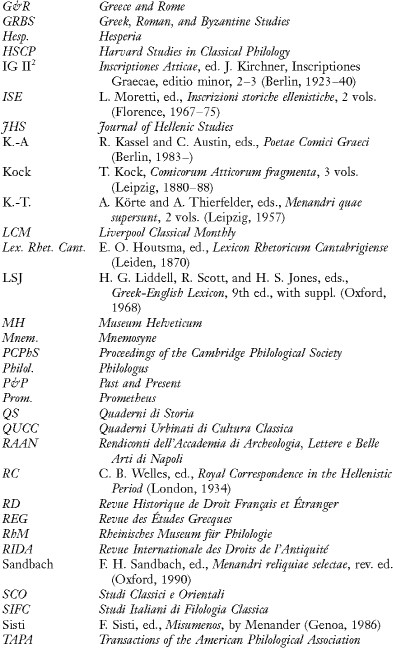
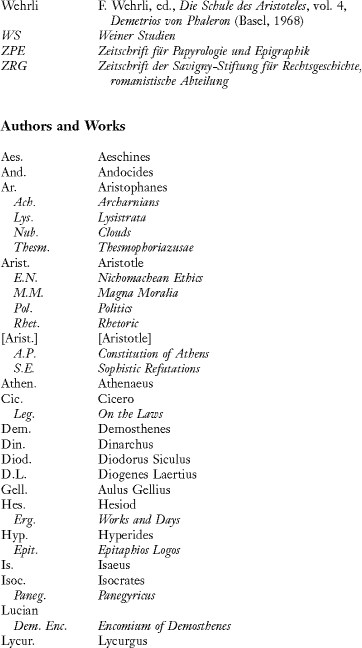

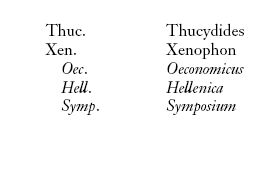
REPRODUCINGATHENS
Narratives of Resistance and Romance
DEMOCRACY AND COMEDY IN THE EARLY HELLENISTIC PERIOD
Resilient Democracy and the Rise of Romantic Comedy
Athenian history between the battle of Chaeronea in 338 B.C. and the end of the Chremonidean War in 260 is punctuated by one military disaster after another. At Chaeronea, Philip of Macedon won a decisive victory over Athens and its allies, enabling him to gain effective control of Athenian foreign policy. In 322 Athens suffered a much more catastrophic defeat in the Lamian War, the Greekled rebellion against Macedonian rule. In the ensuing peace settlement, Antipater, the de facto ruler of Macedon, installed Macedonian troops in the city, replaced the democratic government with an oligarchy, executed leading democratic politicians, and relocated many disfranchised democrats to Thrace. These measures, despite their severity and scope, did little to disturb the Athenian commitment to democracy. Following Antipaters death in 319 the Athenians restored the democracy, apparently in the hope of regaining the preLamian War status quo. The problems that erupted with Alexanders unforeseen death, however, had not really been solved. Alexanders would-be successors were still in the process of attempting to seize and define their own spheres of control. Accordingly, without the military power to defend themselves against the emergent military kingdoms, the Athenians were soon forced to capitulate yet again, this time to Antipaters son Cassander. Like his father before him, Cassander continued to employ highly coercive measures to control the Greek cities, including the imposition of oligarchic constitutions and the installation of military garrisons. While the wealth requirement for citizenship under this second oligarchic regime was fairly low, Cassander took an additional, more invasive, step of installing a manager of domestic affairs within the city itself. For the next ten years, Demetrius of Phaleron ruled Athens as a virtual regent on Cassanders behalf.
Although Demetrius of Phaleron is generally credited with ruling welleven hostile sources acknowledge the material prosperity his regime brought to the citythe Athenians were only too eager to restore the democracy. While fifteen years of oligarchic domination seems not to have diminished the Athenian preference for democracy, it did give the Athenians time to come to terms with the new realities of international politics and their citys diminished place within them. By 307 the Athenians were ready to compromise with external autocratic rulers for the sake of maintaining democracy in the city. In fact, the policy of liberating the Greek cities from oligarchic rule adopted by Demetrius Poliorcetes and his father, Antigonus Monophthalmus, made it seem like the Athenians were not compromising at all.
But the reality of Athenss subordinate position became clear when Demetrius Poliorcetes took up residence in the city and, according to some reports, actually moved into the Parthenon. Whatever the truth of the situation, his continued presence in Athens revealed the incompatibility between democracy and dependence on autocratic rule. Athenian relations with Demetrius deteriorated to such an extent that in 301 they refused him entrance to the city. Although Athens declared its neutrality in the affairs of the diadochoi (successors), in 295 Demetrius was able to regain control of the city. This time there seems to have been little or no attempt to make even a pretense of maintaining democratic proprieties; the period is explicitly described in later Athenian sources as an oligarchy.
The history of this periodroughly the transition to the Hellenistic agemight be told as a story of decline, the downfall of the polis and democracy in the face of the more powerful emergent military kingdoms. While this narrative characterizes Athens militarily, it does not capture the complexities of the domestic political scene. Although the constitutional seesawing of the period brought nearly 150 years of democratic stability to an end, Athenss insistent if ultimately ill-fated democratic rebellions speak to the continuity of democratic ideologythe set of beliefs and practices that sustained the identity of Athenian citizens as specifically democratic citizens. By attributing an existence to the democracy during a period of oligarchic rule, the decree invests the democracy with an ontological permanence, declaring it impervious to the ephemeral Macedonian interventions.
The resiliency and intensity of Athenss democratic ethos during this period is remarkable and indeed puzzling because the conditions that made democracy possible were either interrupted, altered, or no longer in existence at all. Under the classical democracy, political institutions were the primary arena in which democratic ideals were instantiated and enacted. Every citizen could claim an equal stake and standing within the democracy, no matter what his place in the social hierarchy, because in the end he was willing to fight and give his body in service to the state. Although the Macedonians took away this power, drastically attenuating the citizen-soldier ideal, all available evidence demonstrates that Athenss commitment to democracy remained strong, becoming perhaps even more deeply ingrained than before.
The persistence of the Athenian democratic ethos during a period in which the democracy had lost its institutional and military mooring raises a number of important questions. How was democratic culture produced and reproduced in the absence of democratic political institutions? How did individuals continue to identify as democratic citizens? What sources of democratic identity emerged to fill the gulf left by the loss of the citizen-soldier ideal and the suspension of democratic institutions? Lycurguss prosecution of Leocrates contains an important clue. In the aftermath of the battle of Chaeronea, the Athenians passed a number of emergency measures, including one stipulating that every able-bodied man could be called on to defend the city against the Macedonian invasion that, at the time, seemed imminent (Lycur. 1.1617, 1.41). Leo-crates, however, fled the city, allegedly in violation of this decree. When he returned to the city eight years later, Lycurgus, architect of democratic renewal after Chaeronea and avid public prosecutor, sought to make an example of him by prosecuting him for treason. To emphasize the egregiousness of Leocrates disloyalty and default on his civic obligation, and in effect to depict him as the sort of citizen who was really responsible for the defeat at Chaeronea, Lycurgus describes the atmosphere of desperation and panic in the city immediately after the battle:
Next pageFont size:
Interval:
Bookmark:
Similar books «Reproducing Athens»
Look at similar books to Reproducing Athens. We have selected literature similar in name and meaning in the hope of providing readers with more options to find new, interesting, not yet read works.
Discussion, reviews of the book Reproducing Athens and just readers' own opinions. Leave your comments, write what you think about the work, its meaning or the main characters. Specify what exactly you liked and what you didn't like, and why you think so.

